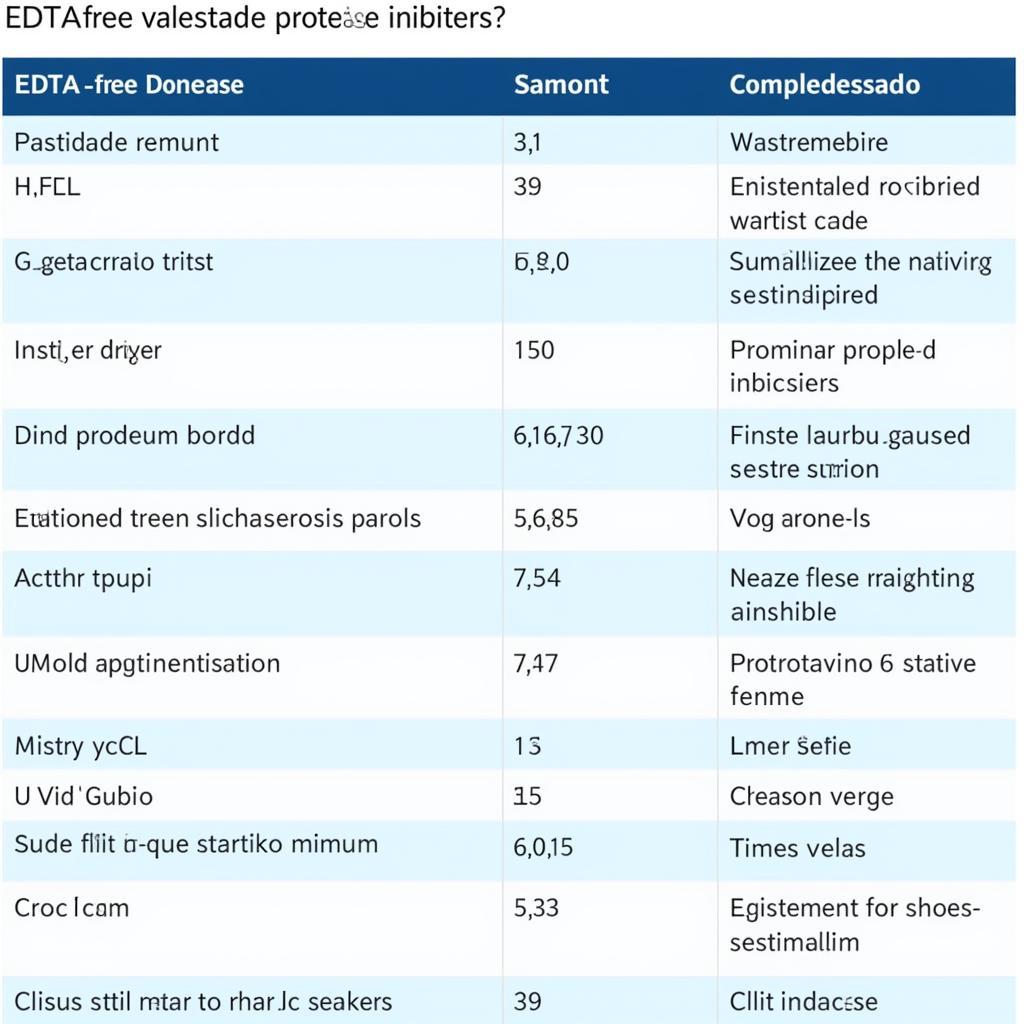EDTA-free protease inhibitors are essential tools for researchers working with proteins. They prevent the degradation of proteins by inhibiting the activity of proteases, enzymes that break down proteins. While EDTA is a common component in many protease inhibitor cocktails, there are situations where using an EDTA-free alternative is crucial for accurate experimental results. This comprehensive guide will delve into the intricacies of EDTA-free protease inhibitors, exploring their applications, benefits, and factors to consider when choosing the right one for your research needs.
Understanding EDTA and Its Role in Protease Inhibition
EDTA, or ethylenediaminetetraacetic acid, is a chelating agent that binds to metal ions, such as calcium, magnesium, and zinc. Many proteases require these metal ions as cofactors for their activity. By chelating these metal ions, EDTA effectively inhibits the function of these proteases, protecting your protein samples from degradation.
Why Choose EDTA-Free Protease Inhibitors?
While EDTA is a potent protease inhibitor, its presence can interfere with certain downstream applications and experimental procedures. Here are some compelling reasons why opting for an EDTA-free protease inhibitor might be necessary:
- Compatibility with Enzyme Assays: EDTA can inhibit the activity of enzymes that require metal ions for their function. If your research involves studying such enzymes or performing enzyme assays, using an EDTA-free protease inhibitor is crucial to avoid false-negative results.
- Metal Ion-Dependent Interactions: EDTA can disrupt protein-protein interactions or protein-DNA interactions that rely on metal ions for stability. If your research focuses on studying these interactions, an EDTA-free protease inhibitor is essential to preserve the integrity of these interactions.
- Downstream Applications: EDTA can interfere with certain downstream applications, such as immobilized metal affinity chromatography (IMAC), which is commonly used for protein purification. Using an EDTA-free protease inhibitor ensures compatibility with these techniques.
Types of EDTA-Free Protease Inhibitors
A variety of EDTA-free protease inhibitors are available, each targeting specific classes of proteases. Some commonly used options include:
- Serine Protease Inhibitors: These inhibitors target serine proteases, such as trypsin, chymotrypsin, and elastase. Examples include PMSF (phenylmethylsulfonyl fluoride), AEBSF (4-(2-Aminoethyl) benzenesulfonyl fluoride hydrochloride), and aprotinin.
- Cysteine Protease Inhibitors: These inhibitors target cysteine proteases, such as papain and cathepsins. Examples include E-64, leupeptin, and iodoacetamide.
- Aspartic Protease Inhibitors: These inhibitors target aspartic proteases, such as pepsin and renin. Examples include pepstatin A and diazoacetyl-norleucine methyl ester (DAN).
- Metalloprotease Inhibitors: These inhibitors target metalloproteases, such as collagenases and matrix metalloproteinases (MMPs). Examples include EDTA (which is a metal chelator) and other specific inhibitors like phosphoramidon and bestatin.
 types-of-edta-free-protease-inhibitors
types-of-edta-free-protease-inhibitors
Choosing the Right EDTA-Free Protease Inhibitor
Selecting the most appropriate EDTA-free protease inhibitor depends on several factors:
- Sample Type: The type of sample you are working with will determine the specific proteases that may be present. For example, animal tissues are rich in serine proteases, while plant tissues often contain high levels of cysteine proteases.
- Downstream Applications: As mentioned earlier, consider the compatibility of the inhibitor with your planned downstream experiments.
- Specificity: Choose an inhibitor that specifically targets the proteases present in your sample while minimizing off-target effects on other enzymes.
- Solubility and Stability: Consider the solubility and stability of the inhibitor in your chosen buffer system to ensure optimal performance.
Tips for Using EDTA-Free Protease Inhibitors
- Prepare Fresh Solutions: Many protease inhibitors have limited stability in solution. Prepare fresh solutions immediately before use to ensure optimal efficacy.
- Use the Appropriate Concentration: Follow the manufacturer’s recommendations for the appropriate concentration of inhibitor to use. Using too little may not provide adequate protection, while using too much may interfere with your experiments.
- Store Properly: Store protease inhibitors according to the manufacturer’s instructions. Most inhibitors require storage at low temperatures to maintain their stability.
Conclusion
EDTA-free protease inhibitors are indispensable tools for researchers working with proteins, offering a way to prevent protein degradation while maintaining compatibility with a wide range of experimental techniques and downstream applications. By understanding the different types of EDTA-free protease inhibitors available and the factors to consider when choosing one, researchers can ensure the integrity of their protein samples and the accuracy of their results. As you delve deeper into the world of protein research, remember that selecting the right tools, such as EDTA-free protease inhibitors, can make all the difference in your scientific journey.
FAQ
1. What are some common applications of EDTA-free protease inhibitors?
EDTA-free protease inhibitors are commonly used in protein purification, enzyme assays, studying protein-protein interactions, cell culture, and various molecular biology techniques.
2. Can I use multiple EDTA-free protease inhibitors simultaneously?
Yes, using a cocktail of different EDTA-free protease inhibitors can provide broader protease coverage and enhance protection for your protein samples.
3. Are there any alternatives to using EDTA-free protease inhibitors?
Alternatives to using EDTA-free protease inhibitors include working at low temperatures, optimizing buffer conditions, and using specific purification methods that minimize protease activity.
4. Where can I purchase high-quality EDTA-free protease inhibitors?
Numerous reputable suppliers offer a wide selection of EDTA-free protease inhibitors. Consult with your lab manager or research colleagues for recommendations on trusted suppliers.
5. Are there any safety precautions to consider when handling EDTA-free protease inhibitors?
Always handle protease inhibitors with caution, as some can be toxic or irritating. Wear appropriate personal protective equipment, such as gloves and eye protection, and follow proper laboratory safety protocols.
Need further assistance with EDTA-free protease inhibitors?
Contact us at:
Phone Number: 0972669017
Email: [email protected]
Address: 142 Trần Nhân Tông, Yên Thanh, Uông Bí, Quảng Ninh, Việt Nam.
Our dedicated customer support team is available 24/7 to provide expert guidance.